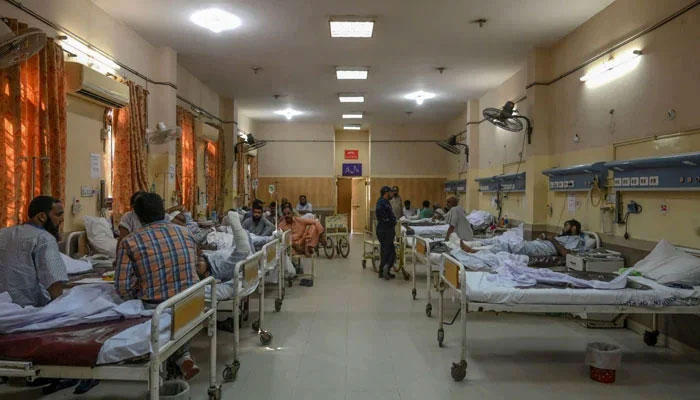Call for acknowledging medical errors instead of concealing them
A staggering 18 to 20 per cent of hospitalised patients in Pakistan lose their lives due to medical errors, negligence, misadministration of drugs, and deadly hospital-acquired infections, experts have pointed out.
Speaking at a press conference ahead of the Patient Safety & Quality Healthcare Conference, organised by the Riphah Institute of Healthcare, and to be hosted by the Aga Khan University in April, leading healthcare professionals called for urgent reforms to improve patient safety in hospitals across the country.
Riphah International University Islamabad Executive Director Asadullah Khan, National Institute of Cardiovascular Diseases (NICVD) Executive Director Prof Dr Tahir Saghir, Patient Safety Association Chairman Dr Zakiuddin, and Syed Jamshed Ahmed spoke at the press conference.
Dr Zakiuddin highlighted that Pakistan’s 18 to 20 per cent hospital mortality rate due to medical errors is alarmingly high compared to global standards. Citing research from the Johns Hopkins Institute, he said that over 100,000 people die annually in the United States due to preventable medical errors. “In the US the leading cause of death is heart disease, followed by cancer, while preventable medical errors are the third most common cause of death. This is a serious issue that requires immediate action.”
He announced that the 8th International Patient Safety Conference would be held at the Aga Khan University Hospital in April, with the primary objective of enhancing patient safety and improving healthcare quality.
He pointed out that several errors occur during medical treatment, including wrong drug prescriptions, incorrect injections, surgical complications, and hospital-acquired infections. “The World Health Organisation has been consistently raising awareness about patient safety, yet many developing countries, including Pakistan, continue to struggle with high rates of medical errors.” He stressed the need for specialised training for medical staff, and the adoption of modern patient safety systems to curb preventable mistakes. “There must be a culture where doctors and nurses acknowledge their errors, and work toward rectifying them rather than concealing mistakes.”
Dr Saghir highlighted that hospital-acquired infections remain one of the leading causes of mortality and chronic illnesses in Pakistan. “At NICVD we receive many infected patients that other hospitals refuse to admit.”
He said that while it is a major challenge, they cannot deny them treatment. “We have set up dedicated isolation wards for such patients, which are regularly fumigated to minimise infection risks.” He noted that over 75 hospitals in Pakistan have conducted specialised training workshops for medical staff, leading to improved patient safety outcomes. “Western countries have significantly reduced medical errors through systematic interventions. While they have achieved up to 80 per cent success, we’re currently striving to control about 50 per cent of the problem.” Khan pointed out that medical errors not only endanger patients’ lives but also impose a heavy financial burden on families and healthcare institutions.
-
 Czech Republic Supports Social Media Ban For Under-15
Czech Republic Supports Social Media Ban For Under-15 -
 Prince William Ready To End 'shielding' Of ‘disgraced’ Andrew Amid Epstein Scandal
Prince William Ready To End 'shielding' Of ‘disgraced’ Andrew Amid Epstein Scandal -
 Chris Hemsworth Hailed By Halle Berry For Sweet Gesture
Chris Hemsworth Hailed By Halle Berry For Sweet Gesture -
 Blac Chyna Reveals Her New Approach To Love, Healing After Recent Heartbreak
Blac Chyna Reveals Her New Approach To Love, Healing After Recent Heartbreak -
 Royal Family's Approach To Deal With Andrew Finally Revealed
Royal Family's Approach To Deal With Andrew Finally Revealed -
 Super Bowl Weekend Deals Blow To 'Melania' Documentary's Box Office
Super Bowl Weekend Deals Blow To 'Melania' Documentary's Box Office -
 Meghan Markle Shares Glitzy Clips From Fifteen Percent Pledge Gala
Meghan Markle Shares Glitzy Clips From Fifteen Percent Pledge Gala -
 Melissa Jon Hart Explains Rare Reason Behind Not Revisting Old Roles
Melissa Jon Hart Explains Rare Reason Behind Not Revisting Old Roles -
 Meghan Markle Eyeing On ‘Queen’ As Ultimate Goal
Meghan Markle Eyeing On ‘Queen’ As Ultimate Goal -
 Japan Elects Takaichi As First Woman Prime Minister After Sweeping Vote
Japan Elects Takaichi As First Woman Prime Minister After Sweeping Vote -
 Kate Middleton Insists She Would Never Undermine Queen Camilla
Kate Middleton Insists She Would Never Undermine Queen Camilla -
 King Charles 'terrified' Andrew's Scandal Will End His Reign
King Charles 'terrified' Andrew's Scandal Will End His Reign -
 Winter Olympics 2026: Lindsey Vonn’s Olympic Comeback Ends In Devastating Downhill Crash
Winter Olympics 2026: Lindsey Vonn’s Olympic Comeback Ends In Devastating Downhill Crash -
 Adrien Brody Opens Up About His Football Fandom Amid '2026 Super Bowl'
Adrien Brody Opens Up About His Football Fandom Amid '2026 Super Bowl' -
 Barbra Streisand's Obsession With Cloning Revealed
Barbra Streisand's Obsession With Cloning Revealed -
 What Did Olivia Colman Tell Her Husband About Her Gender?
What Did Olivia Colman Tell Her Husband About Her Gender?




